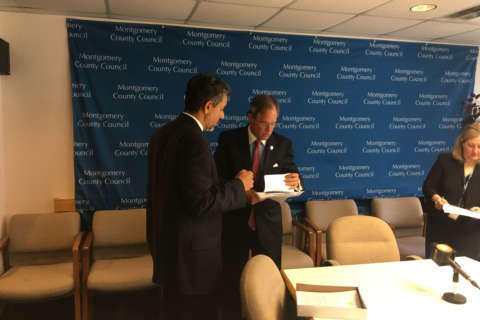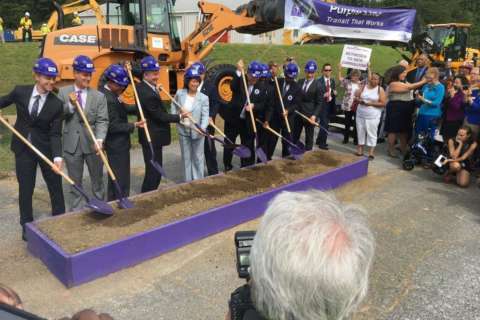
COLLEGE PARK, Md. — Elected officials, business and community leaders signed off on an agreement that’s designed to keep housing and business opportunities along the future Purple Line on a level playing field.
The Purple Line Corridor Coalition agreement has four goals, to support and grow local businesses, to build a thriving labor market, to make affordable housing available and to support vibrant communities.
At the signing ceremony at the newly-opened The Hotel in College Park, speaker after speaker noted that the agreement was not legally binding. Prince George’s County Executive Rushern Baker said that while it’s not a legally binding document.
“It’s historic — We’re signing a moral compact with the community,” he said.
Montgomery County Executive Ike Leggett said the experience of the development and revitalization of Silver Spring serves as an example of what not to do. Leggett said there was not a sustained commitment and plan to keep businesses in place. While there was an effort on the county’s part, he said, “It was too littl”
David Bowers, the vice president at Enterprise Community Partners told the packed hotel conference room that there were 10,000 low-income families along the route of the Purple Line, the 16-mile light rail project that’s designed to link Bethesda to New Carrollton.
Bowers, whose company develops affordable housing, also noted that there’s a plethora of wealth-generating developments in the region.
“We have five, six, seven of the wealthiest counties in the country in this region. In other words, there’s plenty of money in this region!” Bowers thundered. “The question is whether we have the heart.”
He said he wants to make sure that everyone who lives and works along the Purple Line corridor now, can afford to stay once the project is completed and established.
University of Maryland President Wallace Loh said opening doors to opportunity for the communities surrounding College Park is an institutional obligation. He said the goal “is to make sure that the community and the economic benefits of the Purple Line spread throughout the whole region.”
Prince George’s County Council member Danielle Glaros said that despite the fact that the compact is not legally binding, the ceremony should not be seen as a feel-good exercise.
“I think we’re going to look back at this moment and wonder why it took us so long to get here. To make sure that this becomes a corridor of opportunity for all. That is our mission ahead,” said Glaros.
Not everyone attending the event is a fan of the Purple Line. Ajay Bhatt is president of Friends of the Capital Crescent Trail, a group that has filed lawsuits to stop the Purple Line.
“I wanted to see what measures of accountability there are going to be for community development,” said Bhatt, explaining why he attended the event.
Montgomery County Council President Roger Berliner, long a Purple Line supporter, said the agreement is viable.
“Will it be easy? Absolutely not. Will it be perfect? No. But I do think there is a deep commitment to doing this work differently,” Berliner said. “We need to make that investment work for everyone.”









